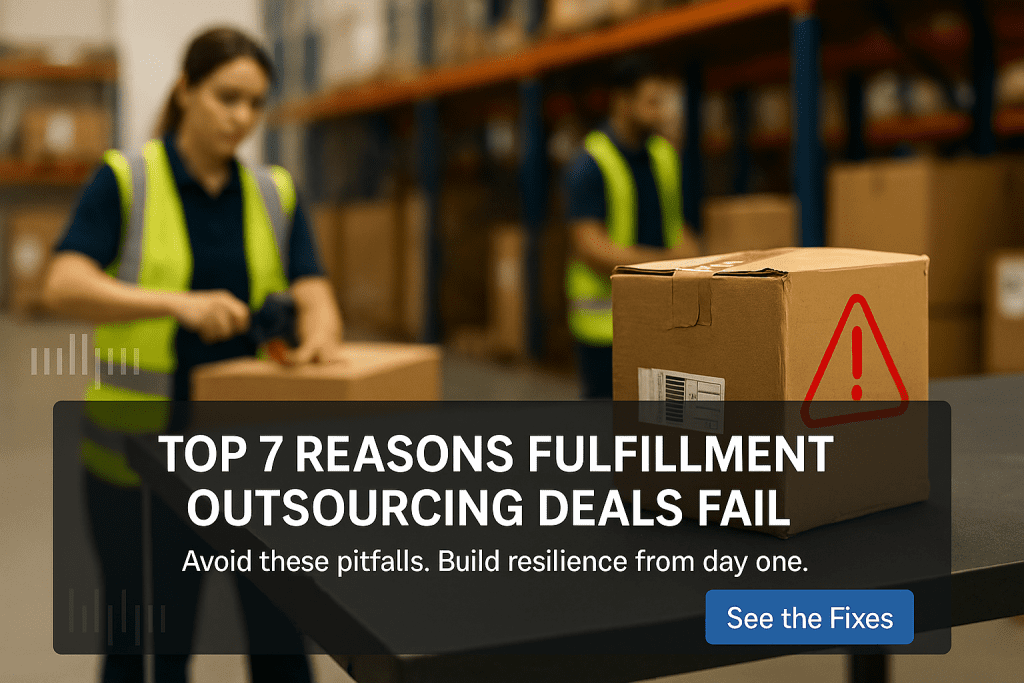Author: Jason Martin
Reviewed by: Supply Chain Solutions Lead
Last updated: November 6, 2025
Executive TLDR
Deals fail when inputs are messy and expectations are fuzzy. Lock product data, barcodes, packaging rules, and ASN fields before day one.
Start with a scoped pilot and a weekly review rhythm. Fix issues while volume is small.
Protect accuracy with FEFO, lot and expiry capture, plus scan at pick and pack.
Control shipping costs with right sized packaging and smart rate shopping.
Use a central U.S. hub to reach most customers in 1 to 3 days by ground.
Want a fulfillment partner that stands this up cleanly — Contact Product Fulfillment Solutions
Table of contents
The trap most brands fall into
The seven failure points to watch
Set up a pilot that actually de risks scale
Why Product Fulfillment Solutions
FAQ
The trap most brands fall into
Outsourcing fulfillment can speed you up, or it can add chaos. The difference is not luck, it is setup. When catalog data, labels, and rules are unclear, the warehouse guesses. Guesses cause delays, chargebacks, and angry customers. The fix is simple and boring, make the inputs clean, start small, measure often.
The seven failure points to watch
1) Messy product data and barcode mapping
If SKUs, variants, and barcodes do not line up one to one, receiving crawls and mispicks rise. Solve it with a clean product master, one scannable code per sellable unit, clear titles, accurate dimensions and weights. When items look alike, separate locations and add large, high contrast labels. If you need help tightening this, see 3PL fulfillment.
2) No ASN discipline at inbound
Carton contents that do not match the ASN lead to shorts, overages, and rework. Standardize ASN fields, carton and pallet labels, and book dock appointments. Post a receiving checklist at the door so dock to stock stays within 1 to 3 days. Learn how we stage and store with warehousing and storage solutions.
3) Weak controls for dated and regulated items
Supplements and cosmetics need FEFO, lot and expiry captured at receiving, and enforced at pick. Missing dates create waste and write offs. Use location flags that say lot required and audit a few bins daily. If you sell in sets, include lot fields on kitting sheets. For more, see health and wellness fulfillment services.
4) Packaging rules that inflate DIM weight
Right sized packaging protects margin. Oversized cartons push billable weight up, and thin mailers damage goods. Build a simple box or mailer matrix by family, test before peak, and lock pack instructions in the WMS. When you are ready, plug in pick and pack services.
5) No pilot, big bang launch
Trying to flip the entire catalog on day one hides issues. Start with a pilot of top movers, usually 20 percent of SKUs that drive most orders. Run a live smoke test, fix slotting and pack outs, then scale in waves. If you need it fast, pair the pilot with ecommerce fulfillment services.
6) Missing channel and retailer overlays
Retail and marketplace flows add stickers, case packs, and ASNs with strict formats. If you bolt these on late, chargebacks follow. Stand up EDI solutions and connections early and keep simple label templates at the bench.
7) Governance and visibility gaps
If no one meets weekly, small problems turn into big ones. Run a quick cadence with shared dashboards for on hand, on order, days of cover, dock to stock, pick rate, and accuracy. Use alerts for low stock and late inbound. Real time visibility is covered under real time information.
Set up a pilot that actually de risks scale
Scope
Pick a narrow set of fast movers, separate look alikes, and define kitting or inserts.
Data and labels
Map SKUs to barcodes, confirm label placement, lock carton and pallet label formats.
Inbound
Send a small, clean shipment with a booked dock time and an accurate ASN.
Outbound
Run real orders for a few days. Measure travel time, pick lines per hour, accuracy, relabels, and DIM costs.
Tune and expand
Fix slotting, packaging, or steps that create delay. Add the next SKU tier and any retail overlays. Keep weekly reviews.
If you also sell on Amazon, stand up compliant prep with FBA prep services, so units arrive accept ready.
Why Product Fulfillment Solutions
Central U.S. hub in Cincinnati, reach most customers in 1 to 3 days by ground.
Barcode first receiving aligned to the ASN, consistent dock to stock speed.
FEFO, lot and expiry control tailored for supplements, vitamins, and cosmetics.
Pick and pack standards and kitting for sets and subscription boxes.
Small parcel optimization with right sized packaging and smart rate shopping.
Retail and EDI compliance so channel growth does not trigger chargebacks.
Explore discounted shipping rates to protect margin as you scale.
FAQ
How long should a pilot run
One to two weeks is enough for fast movers. You want a full cycle of inbound, pick, pack, and returns.
What accuracy should we target
Aim for 99.7 percent or better. Use a second scan at pack on risky items to get there.
What if our catalog is large
Start with the top movers. Add families in waves, and keep a weekly review until metrics stabilize.
Do we need EDI on day one
If you sell to retailers, yes. If not, build the templates and label rules now so you can add wholesale without a scramble.
How do we avoid DIM surprises
Right size packaging, then rate shop by weight and zone. Check the top ten SKUs weekly during ramp.

